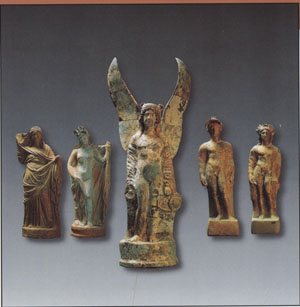CAC's Western Canada Tour Lecture comes to UW - Classics Feature Part 3
Wed. Sep. 16, 2015

The Winnipeg Art Gallery’s exhibit, Olympus: The Greco-Roman Collections of Berlin, brings to us more than 160 classical treasures from the National Museums of Berlin, and so doing, it is the largest exhibit of classical antiquities to be held in Manitoba in more than 50 years. It’s no surprise, then, that the usually busy faculty, staff and students of the University of Winnipeg’s Department of Classics is working even harder this year to maximize the benefit of having this amazing exhibit in Winnipeg and almost next door!
In this four part series, we feature UWinnipeg’s Department of Classics and look at some of events and activities the Department is planning in association with the exhibit.
In Part 1, I caught up with Dr. Allison Surtees to ask her for some background about her work, about the conference, Methodologies in Ancient Material Culture, and how she came to be hosting it with Dr. Kate Cooper at the University of Winnipeg.
In Part 2, Dr. Surtees tells us about the keynote address for the conference Methodologies in Ancient Material Culture, which is being given as the University of Winnipeg 2015-16 Bonnycastle Lecture.
Here in Part 3, we look at this year's Western Canada Tour lecture, organized by Dr. Conor Whately, and see how this ties in with the Olympus exhibit.
In 2013-14, Dr. Conor Whately, Assistant Professor in the Department of Classics, became the organizer for the western tour of the Classical Association of Canada (CAC). The western tour is one of three annual tours held under the rubric of the CAC, the other two being a central Canada tour (Ontario and Quebec) and an eastern Canada tour. They involve established academics, usually from one part of the country, giving talks to Classics departments in different parts of the country from their own.
For this year, there are 6 stops on the western tour, two of which are in Winnipeg, i.e. the Universities of Winnipeg and Manitoba. In keeping with the interest spawned by the Olympus exhibit, i.e., Greek material culture, Dr. Whately invited Dr. Maria Papaioannou, Associate Professor and Director of the Centre for Hellenic Studies at the University of New Brunswick, to be this year's CAC's Western Tour lecturer. Dr. Papaioannou did her undergraduate work in archaeology at the University of Thessaloniki in Greece, before doing her MA (Classical Archaeology) and Ph.D (Classics) at the University of British Columbia. Click here to go to Dr. Papaioannou's full bio on the University of New Brunswick website.
Admission to the lecture is free and all faculty, staff, and students, as well as the general public, are welcome to attend. In addition to having an intriguing research program, Dr. Papaioannou is passionate about bringing the study of archaeology to the public, so her talk promises to be of interest to a general audience as well as to specialists. Indeed the title for her talk, below, assures us that it’s one not to be missed!
Lecture title and brief description
"A journey through the ruins of Ancient Abdera: Man-eating horses, the atom, and cranial surgery": Ancient Abdera, a city little known to the western world, lies along the fertile coast of northern Greece. According to some mythical accounts it was founded by the hero Herakles, however the city’s 'claim to fame' was not mythical but cultural as it was once the home of the famous philosopher and mathematician Democritus, often acknowledged as the father of modern science and the atom theory. This talk will take us on a tour through the ancient site as we explore the remains of houses, ship sheds, harbours, and cemeteries, and I will present some of the results of my research in an attempt to reconstruct the physical environment and provide a glimpse of everyday life in this ancient city.
